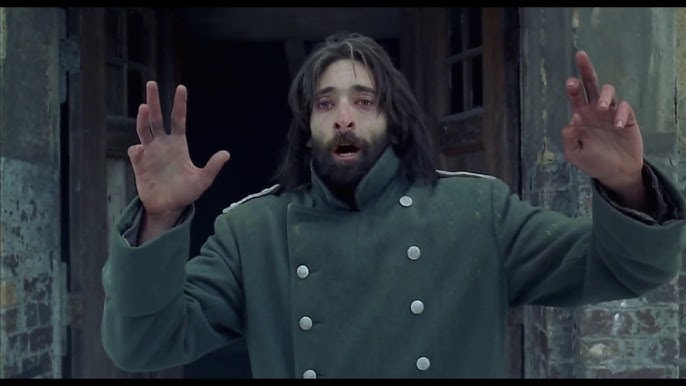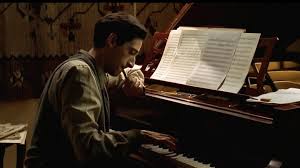🎬 The Pianist (1999)

🎬 The Pianist (1999)
Overview:
“The Pianist” (1999), directed by Roman Polanski, is a gripping and deeply emotional war drama based on the autobiography of renowned Polish-Jewish pianist and composer Władysław Szpilman. The film recounts Szpilman’s harrowing survival through the Holocaust in Nazi-occupied Warsaw. Played by Adrien Brody, Szpilman’s journey from a celebrated musician to a hunted fugitive is a powerful testament to human endurance and the struggle to maintain one’s humanity amid the brutal horrors of war. As Warsaw falls to Nazi forces in 1939, Szpilman’s family is forced into the Warsaw Ghetto, and as the war progresses, he is separated from them and left to survive in a devastated and increasingly hostile environment.
Polanski, who himself survived the Holocaust, brings a personal and haunting perspective to this tale of survival, using his signature cinematic style to evoke tension, empathy, and despair. The film focuses not only on Szpilman’s physical struggle to stay alive but also on his emotional and psychological survival, as he clings to his music as a source of identity and hope. “The Pianist” is both a devastating portrayal of the horrors of war and a celebration of the resilience of the human spirit. Through Szpilman’s story, the film explores themes of isolation, survival, loss, and the transcendent power of music.
Expectations:
“The Pianist” was highly anticipated not only because of its subject matter but also due to its exceptional pedigree. Roman Polanski was already an acclaimed director known for his ability to tell stories that balance suspense, tragedy, and personal introspection. Coupled with a powerhouse performance from Adrien Brody, who was relatively unknown at the time, expectations for the film were high. The film’s subject matter, exploring the human cost of war through a deeply personal lens, promised to be both heartbreaking and enlightening.
Critics and audiences alike expected a film that would be hard to watch but necessary. The Holocaust has been depicted in many films, but “The Pianist” was anticipated to offer a more intimate portrayal of a single individual’s struggle. Szpilman’s story, unlike others that focus on entire families or communities, promised a more nuanced and individualistic perspective on survival, trauma, and resilience. Given Polanski’s own background as a Holocaust survivor, it was clear that the film would have a deep, personal resonance that could speak to the universal experience of loss, hardship, and perseverance.
The film’s potential to be both an artistic and emotional triumph was clear from the outset. With the use of Szpilman’s music and the looming shadow of Nazi occupation, it was expected that “The Pianist” would deliver an unforgettable cinematic experience, exploring not only the horror of war but also the survival of the human soul against all odds.
Review:
“The Pianist” is a film that pulls no punches in its portrayal of the horrors of war. From the very first scenes, the viewer is thrust into the despair of a world turned upside down. Polanski’s direction is haunting and precise, capturing the emotional and physical devastation with a level of detail that is both painful and profound. The film is told in a straightforward manner, with an emphasis on Szpilman’s experiences as a witness and survivor of the destruction around him. There is no attempt to glamorize or soften the brutality of the events depicted; instead, the film invites viewers to experience the tragedy through Szpilman’s eyes.
Adrien Brody’s performance as Władysław Szpilman is nothing short of extraordinary. Brody portrays the musician with a combination of vulnerability and strength that makes Szpilman’s journey feel personal and universal at the same time. Brody’s physical transformation for the role is also worth noting—his portrayal of Szpilman’s emaciated, starved body as he struggles to survive in hiding is both haunting and heartbreaking. His ability to express so much through silence, often conveying the internal turmoil of Szpilman’s character without dialogue, is a testament to his acting skill.
The film’s pacing is deliberate, allowing the viewer to sit with Szpilman’s pain and fear. The isolation Szpilman experiences is palpable, and the narrative builds its emotional weight slowly, never rushing through the terror he faces. The scenes of the Warsaw Ghetto and the Nazi occupation are visceral and unflinching in their portrayal of human suffering. However, amidst the horror, Polanski also finds moments of grace—Szpilman’s music, in particular, serves as both a metaphor for his inner life and a literal way of keeping his soul intact. The scenes where Szpilman plays the piano, both in private and later for the German officer Wilm Hosenfeld (Thomas Kretschmann), are among the most moving moments in the film.
The cinematography is another standout element of the film. The long, lingering shots of deserted streets and the chaotic scenes in the ghetto convey the desolation and brutality of the environment in which Szpilman finds himself. The film’s quiet moments—Szpilman alone in his hiding place or sitting at the piano—are contrasted with the stark violence surrounding him, making those brief instances of peace all the more poignant. Polanski’s visual style serves not only to tell the story but also to enhance the emotional resonance of Szpilman’s journey.
The supporting cast, including Thomas Kretschmann as Wilm Hosenfeld, also delivers powerful performances. Hosenfeld, a German officer who develops an unexpected bond with Szpilman, is a key character in the film. His role underscores the complexity of human nature, showing that even in times of war, humanity can sometimes be found in the most unexpected places. Kretschmann’s portrayal of Hosenfeld as a man torn between his duty and his conscience adds depth to the narrative, providing a nuanced counterpoint to the brutality of the Nazi regime.
“The Pianist” does not shy away from showing the devastation wrought by war, yet it also highlights the strength of the human spirit. Music, in particular, serves as a lifeline for Szpilman, offering him not only an escape but a way to retain his identity amid the violence and destruction. The film suggests that, even in the darkest times, art and human connection can provide a semblance of hope.
Rating:
“The Pianist” is an exceptional and deeply moving film that tackles difficult subject matter with great care and artistry. Roman Polanski’s direction, coupled with Adrien Brody’s masterful performance, makes it a standout work in the genre of Holocaust films. The film’s unflinching portrayal of survival and its exploration of the human condition in the face of atrocity are both compelling and harrowing. “The Pianist” serves as a poignant reminder of the horrors of war and the resilience required to endure them, while also celebrating the power of art and human connection.
This is a film that stays with you long after the credits roll, forcing you to reflect on its themes of loss, survival, and the redemptive power of music. It is a masterpiece of cinema that will continue to resonate for years to come, making it a must-see for those who appreciate both historical drama and deeply personal stories of human endurance.
Rating: ⭐⭐⭐⭐⭐ (5/5)











